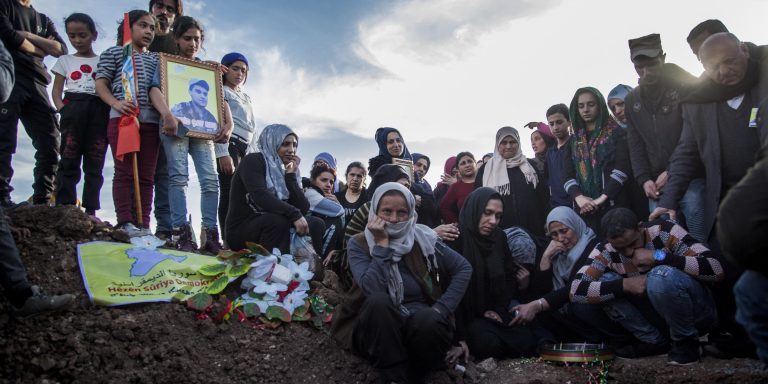INTELBRIEF
May 13, 2020
IntelBrief: Recent Islamic State Attacks Demonstrate its Durability and Resilience

- While much of the world has been struggling to respond to the fallout from the coronavirus (COVID-19) pandemic, the Islamic State has been quietly ramping up attacks in both Iraq and Syria.
- Coupled with a drawdown of U.S. troops and the repositioning of Iraqi security forces to urban areas, vulnerabilities have emerged, allowing IS fighters to seize the opportunity to fill the vacuum.
- With access to millions of dollars and a fighting force in the thousands, the Islamic State is well-positioned to wage a low-level insurgency across Iraq and Syria for the better part of the next decade.
- Beyond the Levant, Islamic State franchises, affiliates, and satellite groups continue to ebb and flow, claiming responsibility for recent attacks ranging from sub-Saharan Africa to Southeast Asia.
.While much of the world has been struggling to respond to the fallout from the coronavirus (COVID-19) pandemic, the Islamic State has been quietly ramping up attacks in both Iraq and Syria. Islamic State offensives over the last few months prove that the group is far from defeated and is foreshadowing its ability to persist as an insurgent organization capable of destabilizing the region through hit-and-run attacks, deadly ambushes, and suicide bombings. Although U.S. President Donald Trump has pronounced the Islamic State ‘defeated’ on more than a dozen occasions, it is clear to anyone paying attention that the group is anything but finished. Indeed, its recent offensives in Iraq and Syria and the expansion of affiliate and franchise groups abroad reveal a group that is merely in the latest phase of an ongoing transformation.
In Iraq, the U.S.-Iraqi alliance is under strain as Baghdad, pressured by Iran, begins to reassess the bilateral relationship with Washington. Iraq continues to experience widespread political turbulence, even as its security forces have come under assault from Islamic State attacks. In Kirkuk, Islamic State fighters attacked a building housing Iraq’s intelligence directorate. Besides Kirkuk, attacks have also skyrocketed in Diyala and Salahuddin. The coronavirus has provided militants with more freedom of maneuver and ability to exploit operational space, with recent attacks targeting military checkpoints run by militias affiliated with the Iraqi security forces. Coupled with a drawdown of U.S. troops and the repositioning of Iraqi security forces to urban redoubts, vulnerabilities have emerged, allowing IS fighters to seize the opportunity to fill the vacuum. There are serious concerns that with additional momentum, IS fighters will seek to encroach upon cities and urban areas, where spectacular attacks could result in large-scale casualties. IS appears to be pushing closer to Baghdad, Iraq’s capital.
The Islamic State has also grown far more active in Syria since late 2019, launching sporadic attacks east of the Euphrates River and expanding its presence throughout parts of the Central Syrian desert. IS militants have also been contesting territory controlled by the Syrian Democratic Forces (SDF) and a number of recent prison breaks in northeastern Syria have led the Syrian Kurds to appeal to U.S. forces for assistance. The Islamic State continues to earn money through extortion, and without the expenses of maintaining its once vast caliphate, the group will likely be able to survive off of the once immense war chest it amassed between 2014 and 2018. With access to millions of dollars and a fighting force in the thousands, IS is well-positioned to wage a low-level insurgency across Iraq and Syria for the better part of the next decade.
Beyond the Levant, Islamic State franchises, affiliates, and satellite groups continue to ebb and flow. A flurry of recent activity in Mozambique signals the group’s expansion in sub-Saharan Africa, while the destruction of several government boats in the Maldives could signal trouble for the island nation. In Afghanistan, the Islamic State Khorasan Province (ISKP) will look to benefit from the withdrawal of U.S. troops over the remainder of the year, and claimed responsibility yesterday for a deadly suicide attack during a funeral in Nangarhar, resulting in dozens killed. There was also an attack at a maternity ward in Kabul, and although no group has yet claimed responsibility, many have pointed to ISKP as the most likely culprit. In the Philippines, IS-linked militants conducted an attack that killed 11 Filipino soldiers. IS has also recently claimed attacks in Egypt’s Sinai Peninsula and Pakistan. The arrest of four Tajik nationals in Germany who were plotting to attack U.S. military personnel and facilities uncovered a link between those arrested and Islamic State leadership in Iraq and Syria. The foiled plot in Germany is foreboding because it could signal a renewed commitment on the part of IS to launch external operations in the West. Accordingly, this suggests that the Islamic State may no longer be content to rely on its propaganda to inspire its supporters in Europe and is instead determined to play a more direct role in planning attacks as it did in Paris in November 2015 and Brussels in March 2016.
.
For tailored research and analysis, please contact: info@thesoufancenter.org